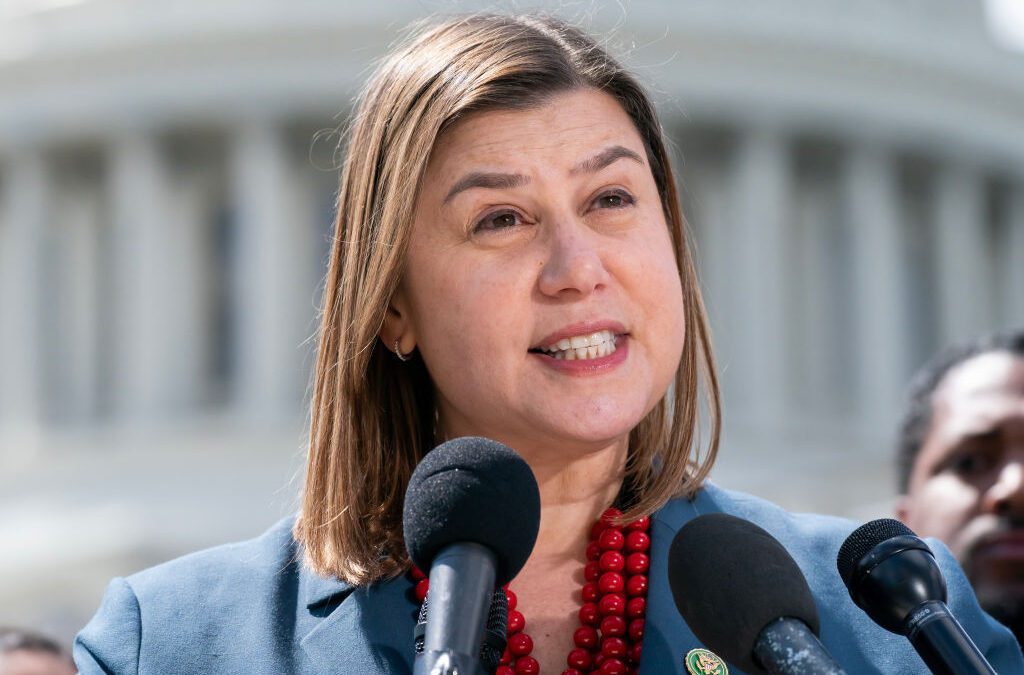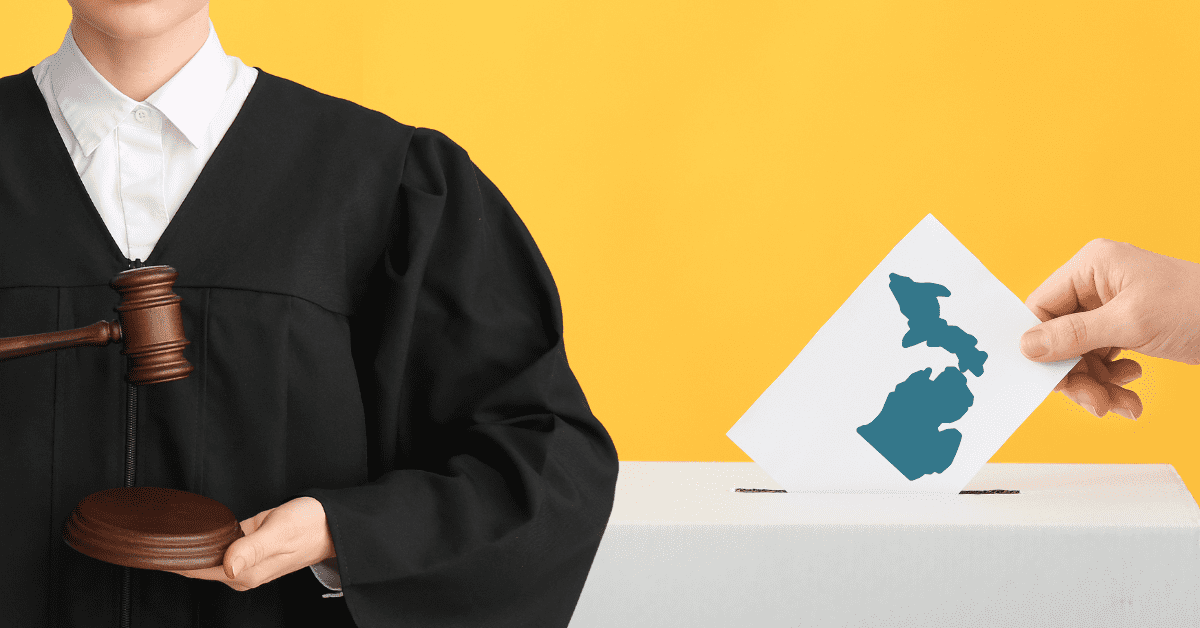
Gov. Gretchen Whitmer presents her latest executive budget recommendations to state lawmakers on Wednesday.
Gov. Gretchen Whitmer’s latest state budget recommendations are all about lowering costs—and ensuring more children are prepared to ‘make it’ in Michigan.
LANSING—Michigan kids are poised to reap some of the biggest rewards of Michigan’s new state budget after Gov. Gretchen Whitmer this week proposed plans to boost funding at public schools and deliver on her promise to provide free education from preschool through college.
“As we talk about what the future economy looks like, we know that we have to be a state of lifelong learners,” Whitmer told a joint session between the state House and Senate appropriation committees on Wednesday, as she outlined her latest budget recommendations.
“It used to be that you attain a certain skill set and you were set for life,” Whitmer continued. “But with an economy that is eternally changing, and doing so so quickly, we’ve got to be nimble and we’ve got to make sure that we’ve got the skills that lead to high-wage jobs. The investment from early childhood to leveling barriers so that people can get advanced skills is something that is not just important for the individual … but it’s also for our collective economy going forward.”
The $81 billion budget plan that Whitmer presented to state lawmakers this week is just the start of the state of Michigan’s annual budget-setting process; the state Legislature will now work over the coming months to pass a budget of its own—with a self-imposed deadline of July 1.
Education officials touted Whitmer’s plans as a game changer for young families and public schools. And if the historic investments are approved by lawmakers, they could drive long-term change in Michigan’s public education system and better prepare kids for future success.
Here’s a quick roundup of how the new budget plan would invests in Michigan kids and schools:
1. Record-Setting School Funding
Whitmer’s $80.7 billion budget recommendation includes $19 billion to support public schools—including a $241 (or 2.5%) increase in the base amount that each district receives per student. All told, her plan would bring state funding to a record-setting $9,849 per student.
In a statement, Michigan League for Public Policy President Monique Stanton said the funding for public schools and students is “absolutely essential when it comes to student success.”
“Bold action is needed now to support children, families and workers in our state, especially given that poverty is on the rise in more than half of Michigan’s counties,” Stanton said. “The governor’s budget provides a beacon of hope for Michiganders who are struggling.”
Whitmer’s budget plan also sets aside money for rainier days—including by paying off unfunded liabilities in the Michigan Public School Employees’ Retirement System and freeing up an extra $670 million that can instead be invested this year into classrooms to help children learn.
Whitmer also proposed spending $125 million to continue reimbursements to school districts for transportation costs, which would free up cash that could then be spent in the classroom.
2. Targeted Student Support
Some students need more help than others—and Whitmer’s budget plan recognizes that by investing $300 million for student mental health and school safety needs, $251 million to support literacy grants and literacy coaches, and $200 million for the MI Kids Back on Track program, which provides tutoring and other learning opportunities for kids both before and after school.
The budget plan includes another $127 million to expand support for special education students—marking a 12% increase in state funding compared to the current state budget.
Whitmer also plans to boost state funding by 5% for academically at-risk students, English language learners, career and technical education students, and students in rural districts.
3. Free Breakfast and Lunch
It’s hard to learn on an empty stomach. The current budget recognizes that—with $160 million that provides all 1.4 million Michigan public school students with free breakfast and lunch this year. The move was estimated to have saved Michigan families over $850 per child.
Whitmer wants to keep the funding flowing by allocating another $200 million to provide universally-free breakfast and lunch to every student at every public school statewide.
“When we deliver free breakfast and lunch, that saves every household $850 per student that they have,” Whitmer told lawmakers. “That’s real savings in the pockets of Michigan families.”
4. Free Preschool
Whitmer’s latest budget plan earmarks $63.5 million to provide free preschool for every 4-year-old child across the state—a move that would save families an average of $10,000 a year for each child in preschool, according to state estimates provided by Whitmer’s office.
The governor initially voiced plans to slowly roll out the funding through 2026. But her latest budget would offer free preschool to about 6,800 children this year—about two years early.
“When we get this done, no matter who you are, where you come from, or how much you make, your child can enroll in pre-K and be set up for success,” Whitmer said during her State of the State speech last month, where she announced the accelerated plan to offer free preschool.
Beyond the immediate cost savings, Whitmer said the plan is also geared toward improving literacy rates, helping kids build a “solid academic foundation” for success, and attracting more employers to Michigan by giving working parents more affordable options for child care.
The plan also includes $35 million to open classrooms in underserved pockets of the state.
5. Free Community College
As she outlined in her State of the State speech, Whitmer’s budget aims to fund the first two years of community college for every high school graduate in Michigan. And if the $30 million plan is approved by state lawmakers, it could save students an average of about $4,000.
The goal, Whitmer explained, is to help more Michiganders land “better-paying, high-skill” jobs in a “career they love.” It also aligns with the Whitmer administration’s broader “Sixty by 30” goal of having 60% of working-age adults in Michigan earn a postsecondary education by 2030.
“The most frequent concern I hear from business owners is the need for employees who possess a degree or certificate,” Whitmer said in a statement. “We’re not just lowering education costs by an average of $4,000, but also opening doors to endless opportunities.”
The new plan builds on the Michigan Reconnect program as well as the Michigan Achievement Scholarship—which already provides free tuition at community colleges to Michigan students who are 21 and older, and offers significant financial aid to eligible high school graduates.
“Education does not end after high school graduation,” Whitmer said. “Today, let’s go further. … We’re broadening our vision of education beyond K-12. Every single Michigander can count on a free public education from pre-K through community college. That’s the Michigan guarantee.”
The budget plan also includes a 2.5% ongoing increase for university and community colleges, a $20 million increase in the state’s Tuition Incentive Program—which provides support to lower income students—and $14 million to provide tuition-free education to eligible Native Americans.
6. Career and Technical Education
Whitmer is also looking out for students who don’t necessarily want to go to college.
Her budget plan also earmarked $45 million in additional support for vocational and career and technical education—including equipment upgrades and a new pilot program to connect high schoolers with key industries and pathways to certification, credentials, and high-wage careers.
7. Supporting Students by Supporting Teachers
Whitmer’s budget plan includes $175 million to support the MI Future Educator Fellowship, which covers tuition for college students who want to become certified teachers, as well as provides stipend payments to student teachers who decide to work in Michigan after graduation.
The idea is cyclical: Recruit more teachers into the classroom—and then ensure they stay in Michigan, so they can provide a high-quality education to more Michigan students.
“Not only will this budget expand opportunities for our youngest learners and increase Michigan’s talent pipeline, but it also invests resources in rebuilding the funding for our K-12 education system—investments that are critical for us to reinvent Michigan’s public education system,” Venessa Keesler, president and CEO of Launch Michigan said in a statement.
What’s next?
In addition to prioritizing more money for education, Whitmer also proposed state funding increases to address the ongoing repairs of roads and bridges, provide tax credits for family caregivers, and expand tax subsidies aimed at attracting more businesses to Michigan.
She said that the two priorities that guided her budget proposal this year were “lowering people’s costs and growing Michigan’s economy.” The 2025 fiscal year begins on Oct. 1.
State lawmakers worked at a historic speed last year after Democrats gained full control of the state government for the first time in decades. But the state House is set to be deadlocked 54-54 until at least April, when special elections for two open seats are set to be held.
So far, there have been no signs that Republicans will help pass Whitmer and other Democrats’ priorities—namely because Republicans have opposed nearly every bill so far this year.
The Associated Press contributed to this report.
READ MORE: New Republican budget plan would eliminate free school meals and more
For the latest Michigan news, follow The ‘Gander on Twitter.
Follow Political Correspondent Kyle Kaminski here.
Politics

Elissa Slotkin: Not even birth control access will be safe if Trump wins in 2024
Michiganders may think their reproductive rights are safe, but Trump and Republicans are already plotting their next steps to take away access in...

Why you should care about this year’s Michigan Supreme Court election
Michiganders will soon decide who serves on the highest court in the state—and those two justices will have a hand in making some important...

Dozens march to Flint city hall as the water crisis turns 10 years old
BY KEN COLEMAN, MICHIGAN ADVANCE MICHIGAN—Chanting “Clean water is what we demand,” “Water is a right” and “No justice, no peace,” dozens of people...
Local News

Who makes the best cannabis concentrates in Michigan?
Over the last year, we've asked for reader recommendations for the best dispensaries in Michigan and the best weed, best edibles and best vapes you...

7 quick hits of cannabis news from across Michigan
MICHIGAN—Cannabis is a big deal in Michigan—and there’s never a shortage of newsworthy headlines from the industry as the state inches closer to...






